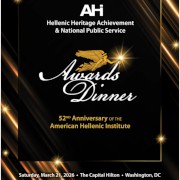Greek-Americans
Asking for Help
A Guide to Networking
In and Out of the Greek Community
March 17, 2004
It is said that in Washington, it’s not what you know, but who you know. Whether it’s trying to find a job or even being set up on a date, the people around you can open doors and make introductions on your behalf that you would never have been able to have gotten on your own. The Greek-American community in D.C. can be a great resource for such networking connections, but it doesn’t happen as often as people outside this community would think and people inside this community would hope.
You can’t get help from a Greek-American or anyone for that matter if you don’t ask for it. Greek-Americans, particularly in D.C., are a notoriously proud, if not stubborn, people. For those of us who are first-generation, we watched our parents come to this country, with limited language skills and resources and make something of themselves without any help whatsoever. (Or at least that’s what we think, or what they’ve told us – remember, Greek-Americans are a notoriously proud people.) So when it comes time for those of us in our generation to face those same challenges that generations before us faced, we rarely if ever ask for help because we think we can do it as good, if not better than they did, without anyone’s help. There’s also the misconception in the Greek-American community that asking for help is a sign of weakness, and that people in this community will basically use that “weakness” against you. More often than not this is what keeps young Greek-Americans from asking for help from those around them.
Finally, there’s the idea that as small as our community is, that there aren’t Greek-Americans around that are in a position to help those of us in our generation, particularly on the job front. Besides the fact that there is usually at least one Greek-American in probably every company, in every field in this city, it’s not what they can do, but to whom they can introduce you. Using your Greek-American network in conjunction with the greater network of people in Washington, D.C., can yield amazing results if you bother to ask. That whole six-degrees of separation thing, suddenly comes down to two-degrees of separation, the level at which things happen in this town.
The surprising thing is that Greek-Americans want to help other Greek-Americans out. Rarely will you find the person out there who will just help you because you’re a Greek-American. These people rarely if ever are able to get you anywhere in this world, unless they are the ultimate decision maker. The real world frowns upon ethnic favoritism as being the only reason to support someone, and sees through it immediately. Thus a good Greek-American won’t simply pass your resume on to their boss because you’ve got a good Greek last name. But if you couple that connection with some substance, and having more in common that just the Greek thing, Greek-Americans in this town will be happy to put in a good word for you, no matter what it is you’re seeking.
And if you think that only Greek-Americans in the older generation can help you, you’re wrong again. There are young Greek-Americans that you see at church, at YAL functions, and at Greek Nights that could help you, if you only knew what they did. We’re too content in this community to know people by sight, sometimes by name, but rarely ever by profession. A few weeks ago we were hanging out with a group of Greek guys at coffee hour and were surrounded by a person that could pretty much answer every pressing need that had come up in our lives within the previous two weeks, a real estate agent, a mortgage broker, and even a dentist.
So next time you’re out with a bunch of Greek-Americans, ask what they do, ask for their business card, and remember that even if you’re not looking for help right at this moment, there is probably another Greek-American out there who could use your help, and the help of those that you can introduce them to in this world.
Read
past feature articles



